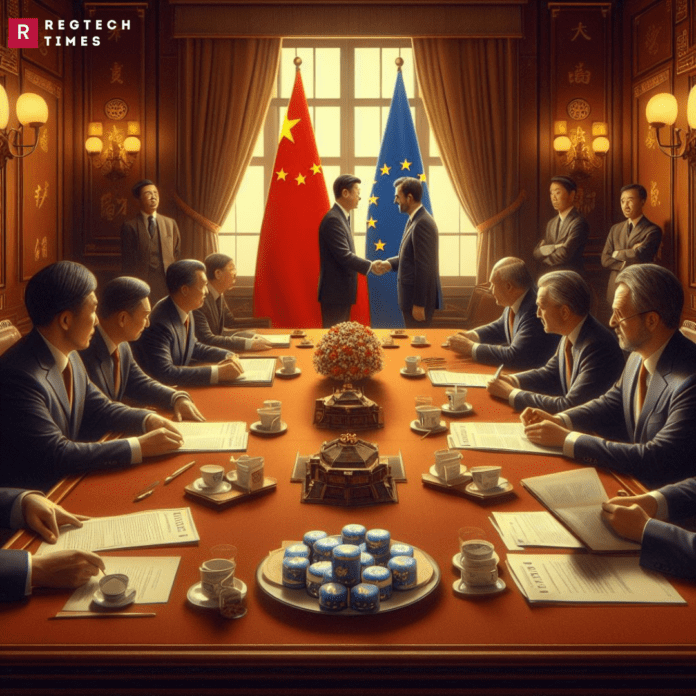Beijing has hinted at potential retaliatory measures against the European Union in response to escalating trade disputes, reminiscent of China’s ongoing trade tensions with the United States. A social media post on Yuyuan Tantian, a platform linked to Chinese state media, indicated that China might take significant countermeasures if the EU continues its investigations into Chinese firms. These probes are examining Chinese subsidies across various industries, with potential tariffs targeting electric vehicle (EV) manufacturers and exclusions from rail and energy tenders.
Xi Jinping’s European Tour and Rising Tensions
Chinese President Xi Jinping recently visited Europe in an attempt to dissuade the EU from adopting a stance similar to that of the US, which has just imposed new charges on certain Chinese imports. This move by the US has heightened concerns in Beijing that American allies might follow suit. Xi’s visit underscores the importance China places on maintaining stable trade relations with the EU, especially as it faces increasing pressure from the US.
Potential Countermeasures and Economic Impact
Although the state media post did not specify particular countermeasures, it quoted a lawyer noting that the EU depends on China for the purchase of agricultural goods such as wine, dairy, and aircraft. The Chinese Chamber of Commerce to the European Union echoed this sentiment, warning that European wine and dairy products might be ensnared in retaliatory actions.
While immediate economic repercussions might be limited—since these industries only constituted about 3% of Chinese imports from Europe over the past year—an escalation into broader tariffs or trade restrictions could significantly impact global companies already grappling with the US-China trade conflict. Hosuk Lee-Makiyama, director of the European Centre for International Political Economy in Brussels, highlighted that the situation could become more complex, involving multiple facets and creating extensive risks for businesses worldwide.
Historical Precedents and Vulnerable Sectors
Historical precedents suggest that food and beverages are particularly vulnerable in trade disputes. China has previously blocked Australian wine and barley, Philippine fruit, and Norwegian salmon, often citing reasons like food safety or anti-dumping. Should China target European exports, it might create opportunities for other producers to fill the void. France, the largest European wine exporter to China, might be particularly affected, although China’s overall wine imports have been declining, and it recently lifted punitive tariffs on Australian wine.
You May Like to Read About Iran’s Retaliatory Sanctions
Recent Chinese Trade Probes
The weekend announcement of a Chinese investigation into alleged dumping of chemicals by the EU, US, and other countries, along with a January probe into EU liquors including cognac, underscores the brewing tensions. This issue was reportedly discussed during Xi’s talks in France, further complicating the trade landscape.
3 German Citizens Arrested for Espionage: Alleged China Spying Raises Concerns
EU’s Stance on Fair Competition
European leaders maintain that their industries suffer from unfair competition due to Chinese subsidies and lack of equitable market access in China. While some EU members are cautious about imposing tariffs, European Commission President Ursula von der Leyen has asserted that Europe is ready to utilize all available tools to protect its industries. Among the investigations inciting Beijing’s ire is a probe into EV producers, which could result in tariffs as early as July. Additionally, inquiries have led to Chinese firms withdrawing from tenders for solar energy projects in Romania and train supplies in Bulgaria.
You may like to read China Sanctions on US Defense Contractors
Agricultural Subsidies and Trade Shields
Despite the ongoing disputes, Europe supports its farmers with substantial subsidies amounting to tens of billions of euros annually. The EU has historically sought to shield agriculture from broader trade conflicts, recognizing the sector’s sensitivity and importance.
Global Trade Implications
In summary, the brewing trade dispute between China and the EU reflects a broader pattern of escalating tensions as major economies grapple with issues of subsidies, market access, and fair competition. China’s potential retaliation, while initially targeting specific sectors, could broaden into a more extensive trade conflict with significant global repercussions. As both sides prepare for potential escalations, businesses worldwide must brace for an increasingly uncertain and complex trade environment. The ripple effects of such disputes could disrupt global supply chains, affect consumer prices, and create strategic shifts in international trade alliances.
Conclusion
The evolving trade tensions between China and the EU are a critical development in global economics, potentially marking a new phase of protectionism and economic nationalism. Stakeholders across industries must stay vigilant and adaptable, as the landscape of international trade is poised for potentially dramatic changes. The outcome of these disputes will likely shape global trade policies and economic strategies for years to come.


